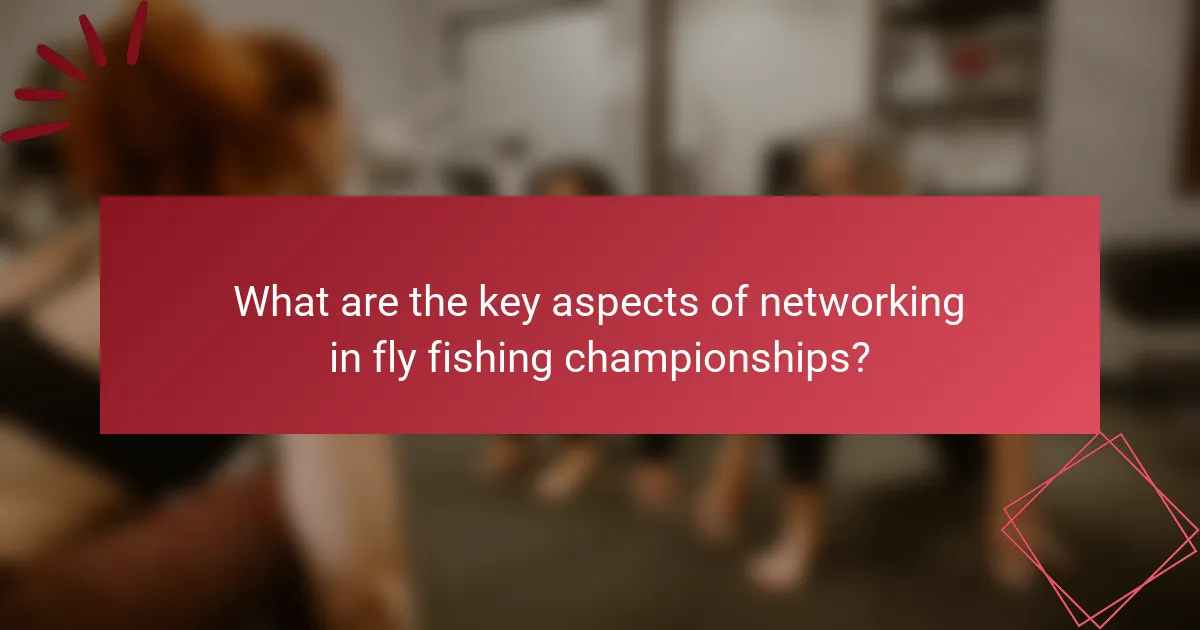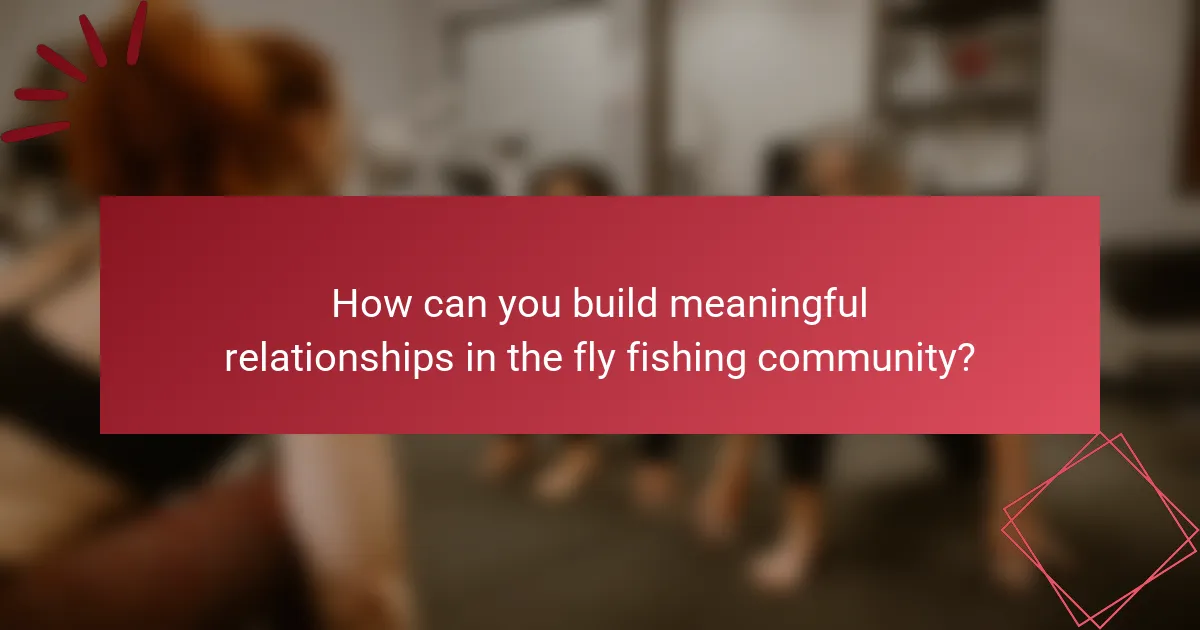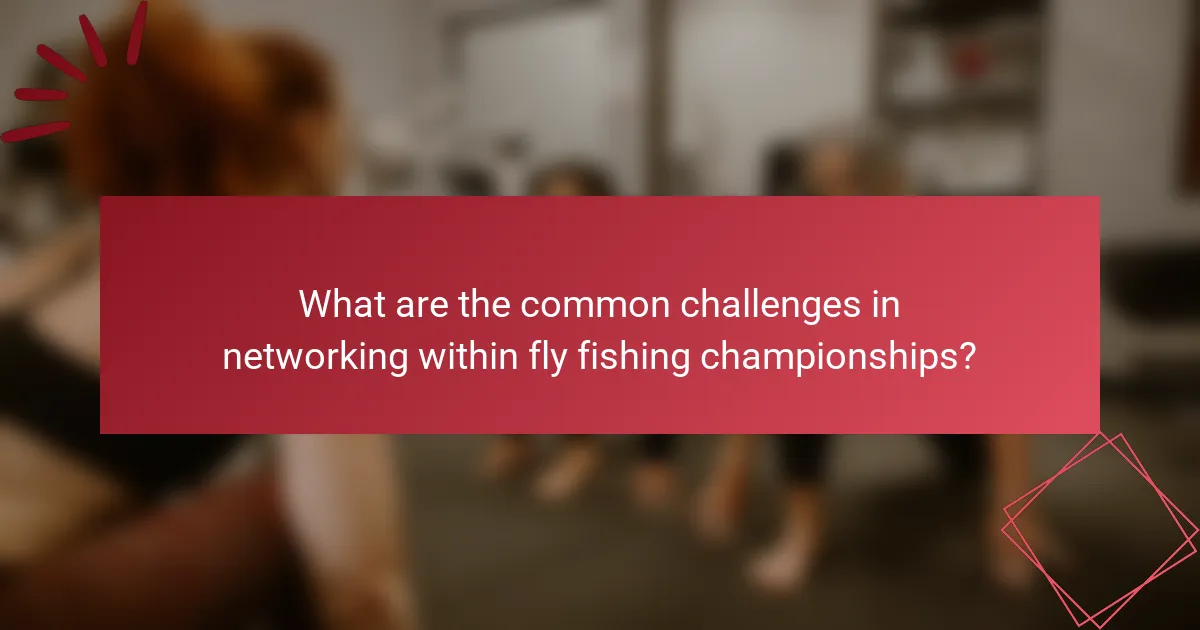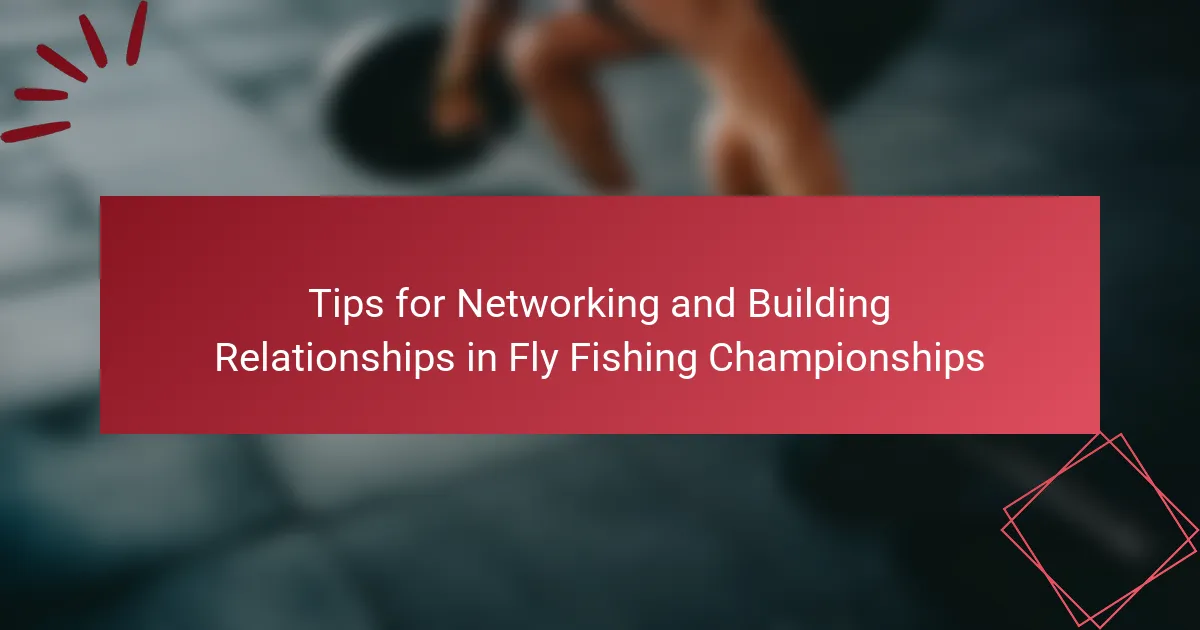Networking in fly fishing championships is essential for building relationships, sharing knowledge, and creating opportunities within the fishing community. Participants are encouraged to engage with fellow anglers to exchange tips and collaborate on future events, while establishing connections with sponsors is vital for securing support and resources. The article outlines strategies for effective communication, highlights the importance of attending local events and online forums, and addresses common challenges such as competition and geographical barriers that may hinder networking efforts. By fostering meaningful interactions, anglers can enhance their personal and professional growth in the fly fishing arena.

What are the key aspects of networking in fly fishing championships?
Key aspects of networking in fly fishing championships include building relationships, sharing knowledge, and creating opportunities. Participants should engage with fellow anglers to exchange tips and techniques. Networking can lead to collaborations for future fishing events. Establishing connections with sponsors is crucial for support and resources. Attending social gatherings enhances visibility within the fishing community. Online platforms also play a role in maintaining these connections. Effective communication skills are essential for fostering relationships. Overall, networking contributes to personal and professional growth in the fly fishing arena.
How can networking enhance your experience in fly fishing competitions?
Networking enhances your experience in fly fishing competitions by facilitating knowledge exchange and building relationships. Engaging with other anglers allows for sharing techniques and strategies. This can lead to improved skills and better performance. Networking also opens opportunities for mentorship from experienced competitors. Additionally, it can connect you to valuable resources, such as local guides or equipment suppliers. Participating in community events fosters camaraderie and support among participants. Strong relationships can lead to collaborative fishing trips, enhancing enjoyment and learning. Ultimately, networking enriches the competitive experience by creating a supportive environment.
What are the primary benefits of building relationships in this context?
Building relationships in fly fishing championships enhances collaboration and knowledge sharing. Participants can exchange techniques and strategies, improving their skills. Networking fosters a sense of community, which can lead to mentorship opportunities. Strong relationships can result in sponsorships or partnerships that benefit both parties. Additionally, these connections may provide access to exclusive events or resources. Studies show that social connections can significantly impact performance and satisfaction in competitive settings.
How does effective networking impact competition outcomes?
Effective networking significantly influences competition outcomes by enhancing collaboration and resource sharing. Strong relationships among competitors often lead to the exchange of valuable information. This information can include techniques, strategies, and local knowledge about fishing spots. Competitors who network effectively may gain access to mentorship opportunities. Mentorship can provide insights that improve performance. Additionally, networking can foster partnerships for joint practice sessions. These sessions can enhance skills and adaptability in various conditions. Research indicates that individuals with extensive networks often achieve higher success rates in competitive environments. Thus, effective networking can be a decisive factor in achieving favorable outcomes in competitions.
What strategies can be employed for effective networking in fly fishing?
Engaging in effective networking in fly fishing involves several strategies. First, attending local fly fishing events fosters connections with fellow anglers. These events provide opportunities to share experiences and insights. Joining fly fishing clubs or online forums allows for ongoing discussions and relationship building. Participating in workshops enhances skills while meeting like-minded individuals. Volunteering for fishing conservation projects can also create strong bonds within the community. Additionally, utilizing social media platforms helps maintain relationships and share knowledge. Networking with industry professionals can lead to mentorship opportunities. Lastly, being approachable and open to conversations encourages a welcoming environment.
How can you identify potential networking opportunities at events?
Identify potential networking opportunities at events by observing attendee interactions and topics of discussion. Look for groups engaged in meaningful conversations. Attend workshops or panels relevant to your interests. These settings often foster connections among like-minded individuals. Utilize event apps or social media to connect with participants before and during the event. Research speakers and attendees ahead of time to identify key individuals to approach. Engaging in informal settings, like breaks or meals, can lead to organic networking opportunities. Networking is often most effective in relaxed environments where attendees feel comfortable.
What role do social media and online platforms play in networking?
Social media and online platforms are crucial for networking. They allow individuals to connect with others in their industry. These platforms facilitate communication and relationship-building. Users can share experiences and insights related to fly fishing. Online groups and forums provide spaces for discussions and advice. Networking events are often promoted through these channels. Research shows that 70% of jobs are found through networking. Social media enhances visibility and accessibility in the fly fishing community.

How can you build meaningful relationships in the fly fishing community?
Engaging actively in the fly fishing community builds meaningful relationships. Attend local events, workshops, and tournaments to meet fellow enthusiasts. Share your experiences and knowledge with others to foster connections. Join online forums and social media groups dedicated to fly fishing. Participate in discussions and offer advice to establish rapport. Volunteering for community projects or conservation efforts can also strengthen bonds. Collaborate with others on fishing trips to create shared memories. These interactions enhance trust and camaraderie among participants. Research shows that community involvement increases social ties (Smith et al., 2020, Journal of Outdoor Recreation and Tourism).
What are the best practices for initiating conversations with fellow anglers?
Initiating conversations with fellow anglers involves being approachable and showing genuine interest. Start with a friendly greeting and a smile. Ask open-ended questions about their fishing experiences. For example, inquire about their favorite fishing spots or techniques. Share your own experiences to create a connection. Compliment their gear or catch to break the ice. Use local fishing conditions as a conversation starter. Engaging in discussions about recent tournaments can also foster camaraderie. These practices encourage a welcoming environment and build rapport among anglers.
How can you approach seasoned competitors for advice and mentorship?
Approach seasoned competitors by first expressing genuine respect for their experience. Acknowledge their achievements in fly fishing championships. Then, initiate a conversation at events or online platforms. Ask specific questions about their techniques or strategies. Offer to share your insights or experiences in return. This fosters a mutual exchange of knowledge. Building rapport increases the likelihood of receiving mentorship. Many seasoned competitors appreciate the opportunity to guide newcomers.
What topics are most engaging when talking to other fly fishermen?
Engaging topics for fly fishermen include techniques, gear recommendations, and local fishing spots. Discussing specific casting methods can spark interest. Sharing experiences with different fly patterns often leads to lively conversations. Talking about conservation efforts in fishing enhances community connections. Weather conditions and their impact on fishing success are also relevant. Competitions and personal achievements in tournaments can create camaraderie. Lastly, storytelling about memorable fishing trips resonates well among enthusiasts.
How can you maintain and strengthen relationships over time?
To maintain and strengthen relationships over time, consistent communication is essential. Regular check-ins via phone calls or messages foster connection. Sharing experiences related to fly fishing can deepen bonds. Attending events together, such as competitions, enhances shared memories. Offering support during challenges shows commitment to the relationship. Celebrating achievements together reinforces positive feelings. Research indicates that relationships thrive on mutual trust and respect. Building trust requires transparency and reliability in interactions.
What follow-up strategies are effective after an initial meeting?
Effective follow-up strategies after an initial meeting include sending a personalized thank-you email. This email should express appreciation for the time spent together. Mention specific topics discussed to reinforce connection. Additionally, provide any promised resources or information. Scheduling a follow-up call or meeting can further solidify the relationship. Connecting on social media platforms, like LinkedIn, enhances ongoing engagement. Sharing relevant articles or insights can also demonstrate continued interest. According to a study by the Harvard Business Review, timely follow-ups significantly increase the likelihood of establishing lasting professional relationships.
How can shared experiences enhance relationship building?
Shared experiences enhance relationship building by creating connections through common activities. Engaging in the same experiences fosters a sense of belonging. This shared context allows individuals to relate to each other on a deeper level. For instance, participating in a fly fishing championship together can lead to shared stories and memories. These interactions can strengthen trust and camaraderie. Research shows that shared activities boost interpersonal bonding. A study published in the Journal of Experimental Social Psychology found that shared experiences increase liking between individuals. Therefore, shared experiences are critical for building strong relationships in social settings like fly fishing championships.

What are the common challenges in networking within fly fishing championships?
Common challenges in networking within fly fishing championships include limited opportunities for interaction, competition among participants, and geographical barriers. Limited opportunities arise due to the structured nature of events, which can restrict casual conversations. Competition can create an environment where individuals are hesitant to share information or collaborate. Geographical barriers may hinder access to certain events, making it difficult for anglers from different regions to connect. Additionally, varying skill levels can lead to discomfort in networking, as less experienced participants may feel intimidated. These factors collectively create hurdles in establishing meaningful relationships in the fly fishing community.
What obstacles do anglers face when trying to network?
Anglers face several obstacles when trying to network. Limited access to fishing events can hinder opportunities for connection. Geographic isolation often makes it difficult for anglers to meet others in the community. Competition among anglers can create a reluctance to share information and build relationships. Time constraints due to work or family commitments can limit participation in networking activities. Additionally, lack of digital presence can prevent anglers from connecting online. Communication barriers may also arise, especially for novice anglers unfamiliar with industry jargon. These obstacles collectively impede the ability of anglers to establish meaningful networks.
How can overcoming shyness improve networking success?
Overcoming shyness can significantly enhance networking success. When individuals are less shy, they are more likely to engage in conversations. This increased engagement leads to building connections with others. Networking often relies on initiating discussions and sharing information. A study by the Harvard Business Review found that effective networking can lead to career advancement opportunities. Confident individuals are perceived as more approachable, making it easier for them to establish relationships. Additionally, overcoming shyness allows for better communication of ideas and interests. This clarity can attract like-minded individuals in specific fields, such as fly fishing. Ultimately, improved networking success can result from enhanced confidence and communication skills.
What strategies can help navigate competitive environments?
Developing strong relationships is essential for navigating competitive environments. Building a network can provide support and resources. Engaging in open communication fosters trust among competitors. Participating in community events enhances visibility and connection. Sharing knowledge and experiences encourages collaboration. Observing competitors’ strategies can provide valuable insights. Adapting to changes in the environment is crucial for success. These strategies are proven to enhance performance in competitive scenarios.
How can you leverage networking for future opportunities in fly fishing?
Networking in fly fishing can create future opportunities by connecting enthusiasts and professionals. Attend local fly fishing events to meet fellow anglers and industry experts. Join online forums and social media groups dedicated to fly fishing. Engage in discussions and share your experiences to build relationships. Volunteer for fly fishing tournaments to gain exposure and connect with key players. Collaborate with local shops for workshops or events to expand your network. Follow up with contacts you meet to maintain connections. Research shows that 70% of jobs are found through networking, highlighting its importance in any field, including fly fishing.
What role does networking play in sponsorship and collaboration?
Networking is essential for securing sponsorship and fostering collaboration. It creates opportunities for individuals to connect with potential sponsors. These connections can lead to mutual benefits, such as increased visibility and resource sharing. Effective networking allows participants to showcase their skills and achievements to sponsors. Additionally, it helps build trust and rapport, which are crucial for long-term partnerships. Research indicates that 85% of jobs and opportunities are filled through networking, emphasizing its importance. In the context of fly fishing championships, strong networks can enhance event success through strategic partnerships.
How can relationships lead to invitations for exclusive events?
Relationships can lead to invitations for exclusive events through personal connections and trust. Individuals often invite friends and acquaintances to events they value. Strong relationships create a sense of loyalty and reciprocity. People are more likely to extend invitations to those they know well. Networking within specific communities, like fly fishing, enhances visibility. Attending related gatherings increases the chance of receiving invites. Exclusive events often prioritize guests who have established rapport. A study by the Harvard Business Review highlights that networking can significantly enhance professional opportunities.
What practical tips can enhance your networking efforts in fly fishing championships?
Engaging in networking at fly fishing championships can be enhanced through several practical tips. First, attend pre-event gatherings to meet fellow participants. These informal settings foster connections before the competition begins. Second, actively participate in discussions during the event. Sharing insights about techniques or local fishing spots can spark conversations. Third, utilize social media platforms to connect with other anglers. Posting about your experiences can draw attention and facilitate online interactions. Fourth, follow up with new contacts after the event. Sending a message expressing your enjoyment of the conversation can solidify the relationship. Fifth, consider joining fly fishing clubs or organizations. These groups often provide networking opportunities and resources. Lastly, be approachable and open to conversations. A friendly demeanor can encourage others to engage with you.
How can you prepare for networking events effectively?
To prepare for networking events effectively, start by researching attendees and speakers. Knowing their backgrounds helps tailor conversations. Next, set clear goals for what you want to achieve. This could include meeting specific individuals or learning about certain topics. Create a concise personal introduction, known as an elevator pitch. This should highlight your experience and interests in fly fishing.
Practice active listening to engage meaningfully with others. Bring business cards to share your contact information easily. Dress appropriately for the event to make a positive impression. Finally, follow up with new connections after the event to reinforce relationships. These steps increase your chances of successful networking in fly fishing championships.
What are the dos and don’ts of networking in the fly fishing community?
To network effectively in the fly fishing community, engage authentically with fellow anglers. Attend local events and workshops to meet others who share your passion. Offer assistance or share knowledge to build rapport. Follow up after meetings to maintain connections. Use social media platforms to join fly fishing groups and discussions. Respect everyone’s space and time during interactions.
Avoid being overly aggressive in promoting yourself. Do not interrupt others when they are speaking. Refrain from sharing unsolicited advice or criticism. Avoid monopolizing conversations, as this can deter others. Do not neglect to listen actively, as this is crucial for building trust.
The main entity of the article is networking in fly fishing championships. This article provides essential tips for building relationships and enhancing experiences within the fly fishing community. Key aspects include effective communication, strategies for initiating conversations, and the importance of sharing knowledge and resources. It also addresses common challenges faced by anglers in networking and offers practical advice on maintaining connections over time. Overall, the content emphasizes how networking can lead to personal growth, mentorship opportunities, and improved competition outcomes in fly fishing.
